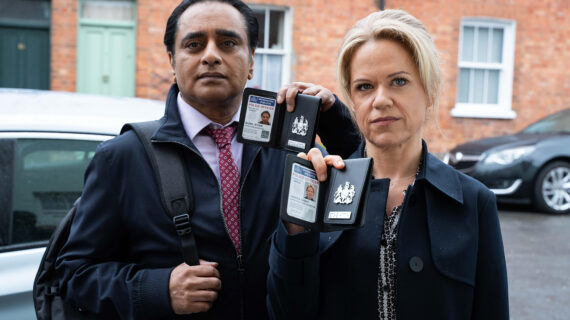Frederica Freyberg:
I’m Frederica Freyberg. Tonight on “Here & Now,” a deal is reached to end the government shutdown. The battle over health care reform in Wisconsin and the latest Marquette Law School poll results. It’s “Here & Now” for January 25.
Announcer:
Funding to provide in part by Friends of Wisconsin Public Television.
Frederica Freyberg:
The shutdown showdown is over for now. This afternoon, President Donald Trump announced an agreement that reopens the government for three weeks while negotiations over border security proceed. The deal between the White House and Congress also gets back pay to federal workers who have missed two paychecks during the 35 day shutdown. The president said back pay would be on its way ASAP. The agreement announced today does not include money for the border wall. Even in announcing the deal, the president renewed his pledge to call a national emergency in order to secure wall funds if Congress does not provide the money.
Donald Trump:
Over the next 21 days I expect that both Democrats and Republicans will operate in good faith. This is an opportunity for all parties to work together for the benefit of our whole beautiful, wonderful nation. If we make a fair deal, the American people will be proud of their government for proving that we can put country before party. We can show all Americans and people all around the world that both political parties are united when it comes to protecting our country and protecting our people. Many disagree but I really feel that working with Democrats and Republicans, we can make a truly great and secure deal happen for everyone. Walls should not be controversial. Our country is built 654 miles of barrier over the last 15 years and every career border patrol agent I have spoken with has told me that walls work. They do work.
Frederica Freyberg:
Republican U.S. Senator Ron Johnson blamed Majority Leader Mitch McConnell yesterday for the shutdown impasse, reportedly telling him it was his fault. Senator Johnson is chair of the Homeland Security Committee. Here’s what he had to say on the deal. He said, “I don’t like shutdowns and I don’t like shutdown politics. It wastes money, hurts the economy and harms real people. I hope we can come to a long-term solution to secure the border and keep the nation safe while funding the government.” Green Bay Republican Congressman Mike Gallagher tweeted this following the announcement of the deal. “800,000 federal employees went without pay for over a month. At the end of it,” he says, “we failed to fix border security and are continuing crisis governance. This is insane.” Democratic U.S. Senator Tammy Baldwin of Wisconsin said this this afternoon “President Trump’s shutdown accomplished nothing and has hurt a lot of people. Now that he has agreed to end it, we can open the government, make sure workers get a paycheck and work together on bipartisan reform to fund border security and fix our broken immigration system.” We spoke with Senator Baldwin earlier in the day before the agreement to reopen the government was hatched. She had a lot to say about immigration reform and the financial impact of the showdown as she watched developments in Washington.
Tammy Baldwin:
Im here unusually on a Friday on stand-by for a vote, if we can get something done today, great, but Ill be here, you know, at a moment’s notice to get this done. We’re talking about the 2019 fiscal year budget and there was already significant border security funding in that measure, to the tune of $1.6 billion in the Homeland Security funding budget. So, you know, President Trump knows that’s there. That’s what his administration asked for at the very beginning of the budget process. But you know, we can’t have this discussion sort of — there’s like a hostage taking right now and people are suffering. There are federal employees literally at food banks and in food lines and we can’t just suspend that while the president digs in his heels. We need to reopen the government urgently and then have discussions. And by the way, the irony — one of the ironies to me is that when this is about border security, we are hearing more and more reports that our security is at risk because of the shutdown. Whether that’s aviation security or any of, you know, the FBI, the border patrol agents who are working without pay right now.
Frederica Freyberg:
What do you think of the idea of the president potentially declaring an emergency, whereby he would just fund the wall with existing funds?
Tammy Baldwin:
You know, I think that we first need to reopen the government. I feel very confident that we have the capacity, Democrats and Republicans in the Congress to find solutions, both on border security and larger immigration issues. My first year in the Senate in 2013, we passed overwhelmingly a comprehensive immigration reform bill that had many border security measures: some human resources, but also using modern technology and surveillance and drones and ways to stop drugs coming in. And we also know that a wall alone is inadequate to that task. President Trump ran on the platform of he’s going to build a wall and Mexico is going to pay for it. Those two pledges, by the way, went hand-in-hand. Now that he wants the taxpayers to pay for it, we have to do what’s smart with taxpayer money. A wall doesn’t stop tunnels. A wall doesn’t stop throwing things over or passing things through. If we want to stop drugs, we have to be compared, or be prepared to work in all of our ports of entry. By way of quick example, the illegal drug Fentanyl, many more times powerful than heroin, much of it is coming through the international mail, which means we have to strengthen security at our international mail facilities, not just on the southern border.
Frederica Freyberg:
Why not just give the president his wall money?
Tammy Baldwin:
You know, because we should never hold people hostage, essentially. You know, we have people who have been working for well over a month now with no pay doing vital security jobs and people are suffering. There’s in some cases going to be permanent harm. People losing homes. Other things that could cause grave danger. We cannot let the president or anyone run a government like this. We need to reopen the government and then we need to have a comprehensive discussion about border security and immigration.
Frederica Freyberg:
What do you say to those who believe the shutdown could be easily weathered or otherwise have down played the consequences of it?
Tammy Baldwin:
You know, I think they’re out of touch with the people of America and the people of Wisconsin. I don’t think enough of my colleagues or people in the administration understand what it’s like to live paycheck to paycheck. You know, I talked to a mother of a person who serves, her son serves in the Coast Guard. He’s not getting paid. And she is working extra hours to help him meet his bills so that he doesn’t have repercussions afterwards for bad credit or a bad credit report. And so it’s impacting people throughout. That should never be the way, especially when we are talking about men and women in uniform defending our country.
Frederica Freyberg:
You have said that you are calling for comprehensive immigration reform. What does that include?
Tammy Baldwin:
You know, in my mind, the immigration system is broken. We’ve seen plenty of evidence of that. I look back to the measure that we passed in the first year that I served in the Senate. It dealt with visa issues. It dealt with dreamers. It dealt with border security issues, and it did so in a manner where we had to compromise. We had to listen to one another and we had to do everything we can to strengthen our country’s borders and our country’s economy. It recognized unique issues like agricultural visa programs don’t necessarily work for dairy farmers where they need their workers 24, well, 24/7 all year around, unlike crop farmers who need them for planting season and harvest season. So, we fixed a lot of those things and again, it was a very broadly supported bipartisan measure. I have every confidence that if we work together and put solutions first, that we can do that job.
Frederica Freyberg:
All right. Senator Tammy Baldwin, thank you very much for joining us.
Tammy Baldwin:
Thank you.
Frederica Freyberg:
I spoke with Senator Baldwin earlier today. We move now from Washington to Wisconsin and state politics. Tuesday night, Governor Tony Evers delivered his State of the State address. His speech sparked news headlines about Wisconsin removing itself from a lawsuit seeking to repeal the Affordable Care Act. But that announcement ran head long into laws signed by the last administration that clipped the executive authority of Governor Evers.
Tony Evers:
People of Wisconsin voted for change this November and asked us to stop playing politics with their health care. That’s why Im announcing tonight that I have fulfilled a promise I made to the people of Wisconsin by a direct — by directing Attorney General Kaul to withdraw from a lawsuit that would gut coverage for the 2.4 million Wisconsinites who have pre-existing conditions.
Frederica Freyberg:
While that pronouncement got big applause from Democrats, it turned out the governor could neither legally direct nor authorize the attorney general to withdraw from the lawsuit that would repeal the Affordable Care Act. Evers lacks that ability because Republicans passed lame duck legislation that gives the legislature’s Budget Routing Committee the final authority over whether to withdraw from such lawsuits. That committee is controlled by a 12-4 Republican majority. In response to the governor’s intention to withdraw his authority to participate in the litigation, Wisconsin Attorney General Josh Kaul sent a letter to Evers stating “my view is that DOJ does not have statutory authority to withdraw the state from the ACA litigation absent approval from the Joint Committee on Finance.” Kaul later sent a letter to the Joint Finance Committee asking to withdraw from the lawsuit. UW-Madison Political Science Professor Howard Schweber told Wisconsin Public Radio this situation is the governor directly challenging the legislature’s authority, saying the question will be decided by the courts over separation of powers under the state Constitution. The same day Governor Evers gave his State of the State speech, the Republican-controlled Assembly passed a health care bill that would go into effect if the Affordable Care Act is repealed by a federal lawsuit. The bill requires health insurers to cover people with pre-existing conditions. It also prevents providers from dropping those who exceed caps on annual or lifetime coverage. Opponents of the bill say rates will soar without the federal subsidies the ACA currently provides. We take this up with a health care expert. Donna Friedsam is the health policy programs director at the Population Health Institute at UW-Madison. Thanks very much for being here.
Donna Friedsam:
Good to be with you
Frederica Freyberg:
So how well, in your mind, would this bill as passed by the Assembly protect people in Wisconsin with pre-existing conditions?
Donna Friedsam:
So, you might recall President Trump memorably said health care is complicated and indeed it is. In this case, it’s a mixed answer because it will protect people to a certain degree, but not as completely as it might seem. The problem is that federal law restricts the ability of states to regulate health plans that are what we call self-insured health plans. And this is — it’s complicated to explain what that is, but in Wisconsin, about one and a half million people, employees are covered by this kind of health plan called self-insured. So those employees and their dependents would not be touched by this, by this state law at all. And they would be only subject to federal regulation and currently that involves the Affordable Care Act. Any kind of state regulation pertaining to pre-existing conditions would not involve these employees. Now, most of those employees work for larger firms and larger firms are very likely to continue to cover pre-existing conditions because they do that to remain competitive in the market. But there’s about 80,000 of those employees that work for firms of fewer than 50 employees, and those employees are going to probably be at some risk that their benefit package will be substantially reduced and possibly not cover the pre-existing conditions that they are currently getting covered under the Affordable Care Act.
Frederica Freyberg:
As to this Assembly bill that passed, it does ban these caps on coverage which mirrors the Affordable Care Act. But what about premium increases or deductions or co-pays?
Donna Friedsam:
Right. So, Governor Evers did negotiate with legislative leadership to include restrictions in annual and lifetime limits and that was probably to the betterment of the bill. So, now if there is no restriction on pre-existing conditions, insurance products also will not be able to limit the amount of payment they provide for services for people on an annual or lifetime basis and that exists currently under the Affordable Care Act. So, for those people that are covered under this bill, the people who have these fully-insured products, they will have that benefit. The other part of this that has been of contention, though, is that the Affordable Care Act also specifies a certain scope of benefits that have to be included in the benefit package, and that’s referred to as essential benefits. The state law does not designate those essential benefits as having to be included. So, critics of the bill will say that insurance companies can simply side step the need to cover those benefits by designing benefit packages that exclude coverage of certain kinds of pharmaceuticals or services for these kinds of high-need services.
Frederica Freyberg:
So, before the ACA on these essential benefits, did insurers generally cover those for people in Wisconsin?
Donna Friedsam:
So, it really depended on who your employer was. Large employers, as I noted, are more likely to provide a robust benefit package. They have the financial capability and wherewithal. But we know that smaller employers and independent businesses had a much more difficult time doing that, and part of what the Affordable Care Act was intended to do, was to create a much larger pool of entities that were all working on a level playing field.
Frederica Freyberg:
How expensive would it be for insurers to cover pre-existing conditions outside the construct of the ACA?
Donna Friedsam:
What the ACA did is it recognized that if we’re asking insurance companies to cover people with pre-existing conditions, that means people who have illnesses that are likely to be expensive, we are also going to need healthy people who are not sick to be buying insurance as well. That’s the risk pool that insurance, that the business of insurance is built upon. So, we need people who are not sick to be purchasing insurance. And the Affordable Care Act provided a number of mechanisms for incentives to help people buy insurance. That includes substantial subsidies for people below four times the federal poverty level. It also included the mandate that turned out to not be terribly effective and was repealed last year. But the big part was the subsidies for people. And if the Affordable Care Act goes away, those subsidies will go away as well. There will be really limited incentives to no incentives for healthier people to buy insurance until they’re sick if insurance companies have to cover them when they get sick. That’s not a good business proposition for insurance companies. A lot of time what I like to explain to people is think about their own homes. We all carry fire insurance on our homes or homeowner’s insurance, even though my home right now is sound and is not on fire. If I didn’t have to carry that homeowner’s insurance but a homeowner’s insurance company would have to cover me if my house went on fire and I could stand outside and call it up and say, “My home is on fire. I now need insurance. There’d be no companies in business that could do that kind of business. And that’s the concern similarly around this. If we don’t get healthy people buying insurance or able to have the subsidies to purchase the insurance, people will wait until they’re sick. It will be a problem to offer affordable health insurance.
Frederica Freyberg:
We will be watching this legislation as it potentially moves through the state legislature. Donna Friedsam, thanks very much.
Donna Friedsam:
Thank you.
Frederica Freyberg:
All this talk about the partial government shutdown, the border wall with Mexico, the ACA lawsuit, and expanding Medicaid. But what do the people of Wisconsin think about it all? In tonight’s inside look, we find out with results of the latest Marquette Law School poll and its director, Charles Franklin. Thanks very much for being here.
Charles Franklin:
Good to be here.
Frederica Freyberg:
Let’s go right to the shutdown and how respondents of your poll reacted to that. On the government shutdown, 66% opposed, 29% of those you surveyed support it. But who do those that you surveyed blame for this?
Charles Franklin:
Well, they say that President Trump is primarily responsible. About 40, a little over 40% say that. Another 7% or so say Republicans. And 34% say the Democrats. And 14% just volunteered to us they’re all responsible. But it’s clear the balance lies with President Trump and the Republicans and that’s very similar to what we have seen in almost all the national polling as well.
Frederica Freyberg:
As to the border wall, 51% of those oppose it and 44% support it. The Trump Administration and Republicans are driving this pretty hard, considering those kinds of numbers.
Charles Franklin:
They are. And especially when you look at that 44 support the wall, but only 29% support the shutdown over the issue of the wall. That’s where the real political slippage is. Trump has actually raised support for the wall from about 37 a year and a half ago, to 44, so it’s gone up a bit. And that’s largely among Republicans who were skeptical initially. But the shutdown, as a part of the wall issue, is really not helping the president’s cause. It’s much worse than support for the wall itself.
Frederica Freyberg:
As for the ACA lawsuit and Wisconsins part in that, 81% of Democrats and Democratic leaners support Wisconsin withdrawing from that suit. 75% of Republicans want Wisconsin to stay in it. So, given the Republican majority in the legislature and how they need now to approve withdrawing from that lawsuit, it seems like a foregone conclusion.
Charles Franklin:
Well, this is our polarized politics that we’ve been used to for so long on the withdrawal from the suit, the split is pretty even. It’s 48 withdraw, 42, I believe stay in. But the partisan split is just as deep as everything else has been over ACA.
Frederica Freyberg:
As for expanding Medicaid in Wisconsin, 88% of Democrats favor that, 43% of Republicans, now that 43% of Republicans seems high to me.
Charles Franklin:
It is. And this is sort of different from the ACA issue. Here Republicans are about evenly split. It’s 43 to 41 among Republicans, a tiny plurality that would favor taking the expansion and that’s very different from the Republican legislator’s view that this is a nonstarter.
Frederica Freyberg:
Does this represent some kind of support for Evers’ agenda?
Charles Franklin:
It is a bit. Now, we’ve asked about Medicaid expansion in the past and it’s been getting in the high 50s to 60 before. So that hasn’t really shifted very much. But this is an issue where the Republicans are not unified about it, compared to what we just saw with ACA where they are unified.
Frederica Freyberg:
As to the lame duck legislation in Wisconsin, your numbers show 55% disapprove, 31% approve. So, at least in terms of public opinion that parting shot on Governor Walker’s part by signing it into law was not popular.
Charles Franklin:
No, that’s right. And the views of Walker signing it are almost identical with the views of the legislation itself. So you see that it was not popular, but you also see it carry over into questions we asked about is Evers trying to cooperate with the Republicans, and Evers is seen as cooperating by over 40 to about 25. Republicans are seen as cooperating by only 22 to 40 something, so you see an opposite gap there of who’s perceived as cooperating or willing to.
Frederica Freyberg:
Let’s take a look at redistricting. 72% favor a nonpartisan commission, 18% favor the legislature and governor.
Charles Franklin:
So boy, that’s lopsided. This is really striking because 62% of Republicans favor a nonpartisan commission and it’s higher of course among independents and Democrats. This is unlikely to move the legislature to give its powers away over redistricting. But as an electoral issue in the future, it’s a serious one because we’ve seen it pass in referenda in other states, including Michigan.
Frederica Freyberg:
Let’s take a look at your polling on Scott Walker, and whether or not people think he ought to run for governor. 53% say no. 37% say yes. Given that he just lost the election, the number seems pretty representative but what does a potential candidate at this point do with that?
Charles Franklin:
Oh, I think it’s simply — I think the main point is, his support is well below the votes that he got a few months ago in the election. He himself brought up the possibility that he might run for governor, might run for Senate. So we asked this question, to get a sense now where it stands. In four years, if he’s an active candidate, we’ll start asking questions again. But in the meantime, this doesn’t show a groundswell for him now that he’s out of office.
Frederica Freyberg:
Super quick. Evers’ favorability, 41% favorable, 24% unfavorable but then a big number of people who just don’t know.
Charles Franklin:
It’s over 30% that don’t know, and this is typical of new governors. That it takes the public a while to get used to them and to figure out what they feel about them. Evers starts with a net positive, which is a good start for him, but a lot of voters are withholding judgment or just haven’t heard enough.
Frederica Freyberg:
Charles Franklin, thanks very much.
Charles Franklin:
Thank you.
Frederica Freyberg:
We return now to the wall dividing Wisconsins Congressional delegation over immigration policy. Members of the Wisconsin Congressional delegation made their case this week on funding for the border wall. Congressman Glenn Grothman traveled to the southern border with Mexico to tour existing infrastructure.
Glenn Grothman:
We’re informed that it would be a definite benefit to have this wall longer.
Frederica Freyberg:
Back in Wisconsin, Congressman Mark Pocan met with TSA agents and air traffic controllers at Dane County Regional Airport.
Mark Pocan:
Even the Republicans in their heart of hearts understood that this is a bad idea. They put the language in the last appropriations process and now here we are fighting over something that all along, they’ve known and put into legislation was wrong.
Frederica Freyberg:
And that is our program for tonight. Tune in to Wisconsin Public Radio all weekend for the latest on renewed border negotiations in Washington. I’m Frederica Freyberg. Have a great weekend.
Announcer:
Funding for “Here & Now” is provided in part by Friends of Wisconsin Public Television.
Search Episodes
Related Stories from PBS Wisconsin's Blog

Donate to sign up. Activate and sign in to Passport. It's that easy to help PBS Wisconsin serve your community through media that educates, inspires, and entertains.
Make your membership gift today
Only for new users: Activate Passport using your code or email address
Already a member?
Look up my account
Need some help? Go to FAQ or visit PBS Passport Help
Need help accessing PBS Wisconsin anywhere?

Online Access | Platform & Device Access | Cable or Satellite Access | Over-The-Air Access
Visit Access Guide
Need help accessing PBS Wisconsin anywhere?

Visit Our
Live TV Access Guide
Online AccessPlatform & Device Access
Cable or Satellite Access
Over-The-Air Access
Visit Access Guide
 Passport
Passport

















Follow Us